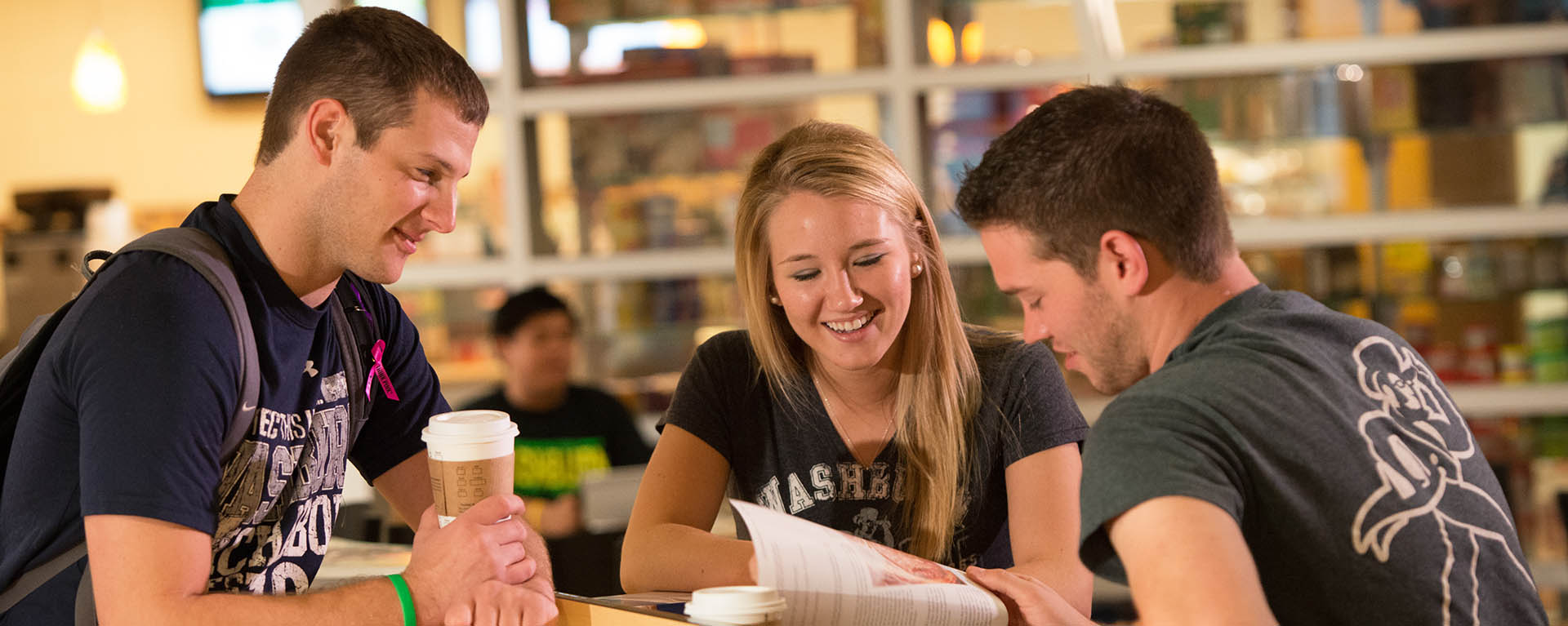
Career Engagement at Washburn University is an integral part of the networks between students/alumni and potential employers. Career Engagement does much more than help students and alumni find jobs. We provide comprehensive Career Engagement and extensive networking opportunities through workshops, seminars, and campus-wide career fairs.
Choosing and attaining a meaningful career requires active participation in all phases of the search as well as a sincere commitment to self-reflection.
Download the 4-Year Plan Handout
Select a year:
Academics: Explore the University
- See your Academic Advisor
- Meet professors and staff
- Attend workshops on: study skills, test taking, time management
- Explore General Education program requirements
- Enroll in College Experience Course, WU 101
- Complete Financial Literacy modules in WU 101
- Explore University Honors Program
- Explore the Aleshire Center for Leadership and Community Engagement programs
Personal: Self-Understanding
- Develop a support group of friends
- Take a personality assessment at Career Engagement
- Get Rec’d! Check out the SRWC
- Do values clarification exercises
- Explore individual counseling with University Counselors
- Identify major fears of college life
- Redefine family relationships
- Sign up for MyMoney Five during your New Student Orientation session
Social: Initiate Relationships
- Join Washburn Residential Council (WRC)
- Get-a-life! Visit Student Involvement and Development to get involved
- Become involved in a campus organization
- Make summer travel plans
- Nurture hobbies
- Develop a peer group
Career: Explore Career Areas
- Attend a career workshop – visit Career Engagement
- Follow the Career Engagement Facebook fan page to get updates on all events!
- Talk with parents, friends, advisors, professors, career counselors
- Do "career testing" through volunteering
- Use "What Can I Do With This Major" and FOCUS2 software on Career Engagement website
- Attend Activities and Majors Fair
- Identify your transferable skills and abilities
- Develop career-related hobbies
SOPHOMORE YEAR – Defining!
Academics: Gain Specific Information
- Seek academic advice from professors and peers
- Grab lunch with one of your professors
- Establish a personal GPA goal
- Choose an academic major
- Develop a tentative academic plan
- Choose electives that match your needs/interests
- Explore Study Abroad
Personal: Explore New Roles
- Find out about international events – check out International House and International Programs
- Find a mentor who can offer support
- Explore individual counseling
Social: Increase Involvement
- Become actively involved in a club/organization, maybe one associated with your possible major
- Volunteer on student committees
- Volunteer in the community
- Join Intramural Teams at the SRWC
- Attend University-wide events, lectures, and performances
Career: Collect More Information
- Read about Careers in the Library and online via FOCUS2 and O*Net
- Conduct an informational interview with someone in your area of interest
- Develop your short term goals for gaining experience and skills
- Look for a summer internship
- Volunteer to “shadow” a professional
- Talk with Specialists in Career Engagement about resumes and internships
- Attend career presentations and fairs to gather information and seek internships
- Claim your account on Handshake to start looking for jobs and internships
JUNIOR YEAR – Researching!
Academics: Make Initial Choices
- Take mock GRE/MCAT or LSAT exams
- Focus on succeeding in major courses – seek tutoring with the Academic Success Center
- Relate academics to future life plans
- Attend departmental seminars/lectures that relate to your major
- Develop an academic mentor
- Consider research opportunities
- Seek out and apply for internships
Personal: Risk Personal Openness
- Seek out sources of support
- Help others with their problems
- Continue discussions with your mentor
- Test ideas through decision groups
- Disagree with an authority – but have a solid reason
Social: Exercise New Skills
- Run for an elected office/get involved in WSGA
- Apply for Resident Assistant (RA) or peer advisor positions
- Become a Big Brother/Big Sister
- Volunteer through Campus Activities Board (CAB)
Career: Increase Experience
- Find internships that interest you
- Make tentative career decisions
- Attend the career and graduate school fairs
- Stop by Career Engagement for a Resume Review and to discuss plans and goals
- Develop general awareness of many career options
- Familiarize yourself with work settings and job descriptions
- Have a Mock Interview with Career Engagement
Academics: Long-Term Decisions
- Prepare graduate school applications
- Apply for awards
- Present projects at scholarly meetings
- Complete your WTE!
- Become a tutor
- Request a senior progress check from Office of Registrar
- Develop an independent study that is meaningful to you
Personal: Make Commitments
- Prepare for your chosen lifestyle
- Attend stress workshops
- Talk about your first year out of school
- Make a list of your firm decisions
- Write down three life-long goals
- Prior to graduation, complete MyMoney Five modules regarding student loan repayment
- Consult financial literacy resources as needed
- Participate in Commencement!
Social: Leadership
- Lead a group or club
- Supervise a few student projects
- Join a professional organization
- Tutor high school students
- Assist in facilitation of leadership conferences and workshops
Career: First Career Choice
- Attend presentations on: job searches, interviewing, and the transition from college life to post-college life
- Attend career fairs and make connections with recruiters!
- Establish life goals
- Develop a contact list of references; use your network to develop leads
- Check Handshake and apply for jobs/Apply to graduate programs
- Interview for jobs or grad/professional school admission
- Develop a budget for graduate school or life after school

